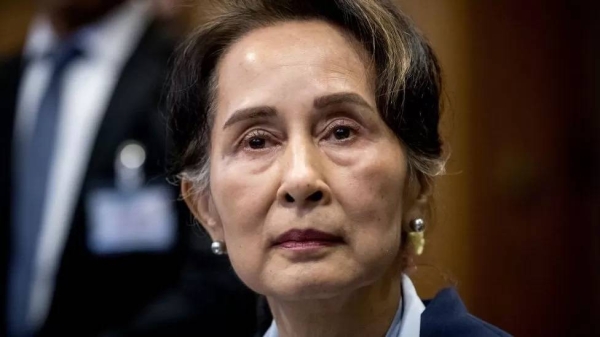
Myanmar has been placed on knife edge, with activists fearing a further clampdown after the military detained Aung San Suu Kyi and other civilian leaders in early morning raids and took direct control of the country in a coup.
A statement attributed to Aung San Suu Kyi said the military, which directly ruled Myanmar for more than 50 years, was trying to reimpose a dictatorship. “I urge people not to accept this, to respond and wholeheartedly to protest against the coup by the military,” it said.
Aung San Suu Kyi has not been seen since the coup, but a Facebook message posted on the account of Kyi Toe, the official spokesman of the ruling National League for Democracy (NLD), said she was being held at her official residence, adding: “She’s feeling well — walking in the compound frequently.”
The military’s actions, which came a decade after it agreed to share power with civilian leaders, were universally condemned by governments around the world.
The US president, Joe Biden, called on the international community to press Myanmar’s military to give up power, release detainees and refrain from violence against civilians. He threatened sanctions, adding that the US will defend democracy around the world.
“In a democracy, force should never seek to overrule the will of the people or attempt to erase the outcome of a credible election,” Biden said.
The UN secretary general, António Guterres, said the developments represented “a serious blow to democratic reforms in Myanmar”.
About 45 people were reportedly detained by the military on Monday, mostly members of the NLD. The army said it was holding government leaders in response to “fraud” in November’s general election – an allegation that observers dismissed as unsubstantiated.
As political figures were detained on Monday, mobile internet services went down and telephone lines were cut in many areas, while military trucks, one carrying barbed-wire barriers, were parked outside city hall. State-run MRTV television reported that it had been unable to broadcast.
In the largest city, Yangon, people flocked to cash machines and food stalls, while some shops and homes removed the symbols of Aung San Suu Kyi’s party.
Phil Robertson, deputy director of Human Right Watch’s Asia division, said the number of people held was likely to increase over the coming days.
“They’ll keep NLD people in detention and then they’ll go after people they view as potential catalysts who could mobilise a resistance to military rule – and they probably have a pretty good idea of who these activists are,” he said.
The coup, Robertson added, was everybody’s worst nightmare. “This is what everybody was most afraid of – that the military would finally say enough is enough and throw Suu Kyi and civilians out.”
Aung San Suu Kyi, who spent nearly 15 years in detention as part of a decades-long struggle against military rule for which she was awarded the Nobel peace prize, won a sweeping election victory in November, securing 396 out of 476 seats, and another five years in government. The military-backed Union Solidarity and Development party won just 33 seats.
Though Aung San Suu Kyi’s international reputation has been severely damaged by her decision to defend Myanmar against allegations of genocide against the Rohingya people, she is still revered by many in the Bamar majority as an icon of democracy.
David Mathieson, an independent Myanmar analyst, said that it was likely many will follow her calls for protests, and that the military may have underestimated the possibility of a strong public response.
“You don’t get to lock up, again, a national idol. The moment Suu Kyi comes out and gives the order to do something, people will probably comply. People don’t want to go back [to full military rule],” he said.
Myanmar’s constitution already grants huge power to the military, giving it control over key ministries and guaranteeing it a quarter of parliamentary seats. Justifying its action on Monday, the army cited a section of the constitution, which it drafted, that allows it to take control in times of national emergency
“The military was already in power – even the ruling NLD was covering up their [alleged genocide] in the ICJ [international court of justice],” said Thinzar Shunlei Yi, a human rights activist based in Yangon.
The facade of democracy in Myanmar had now crumbled, she said. “It’s not real, it’s not genuine, we’re not going anywhere with this framework.”
Some prominent politicians and activists have moved locations as a precaution to avoid military detention.
Ye Wai Phyo Aung, co-founder of the human rights organisation Athan, said the military has always targeted people who demanded democracy and human rights. “The situation has now become a hellhound at large,” he said, adding that the military was hungry to strengthen its power even further.
The military said Min Aung Hlaing, who has taken control of the country, had pledged to practise a “genuine discipline-flourishing multiparty democratic system”.
He promised a free and fair election and a handover of power to the winning party. No timeframe was given.
Four youth groups condemned the coup in statements and promised to “stand with the people” but did not announce specific action.
“Our country was a bird that was just learning to fly. Now the army broke our wings,” student activist Si Thu Tun said.
If supporters of Aung San Suu Kyi take to the streets, this might play into the military’s hands, allowing it to escalate the tightening of movement and expression, said Moe Thuzar, co-coordinator of the Myanmar Studies Programme at ISEAS-Yusof Ishak Institute in Singapore. “I have lived through the 1988 coup and recall how the military responded to protests,” she said, referring to the violent crackdowns in which hundreds were killed and wounded.












